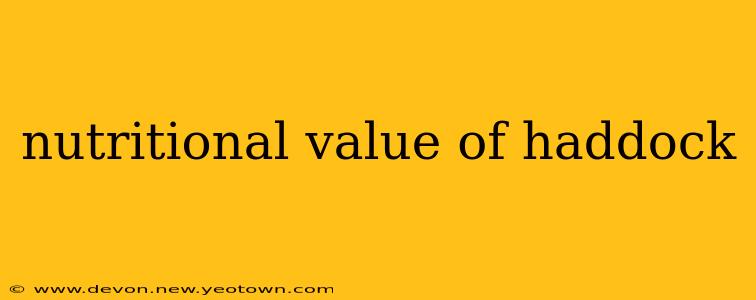Haddock, a lean, flaky white fish, has long been a staple in many cuisines. But beyond its delightful taste and versatility, haddock boasts a remarkable nutritional profile, making it a smart addition to a healthy diet. This journey into the world of haddock will uncover its nutritional treasures and answer some frequently asked questions.
What are the health benefits of eating haddock?
Haddock is a nutritional powerhouse, offering a plethora of health benefits. Its lean protein content supports muscle growth and repair, while its low fat content contributes to maintaining a healthy weight. The story gets even better: haddock is packed with essential vitamins and minerals crucial for optimal health. Imagine a fish that helps build strong bones, supports a healthy heart, and even boosts your immune system – that's haddock in a nutshell! We'll delve deeper into these specifics shortly.
How many calories are in haddock?
The calorie count of haddock varies slightly depending on preparation methods, but generally, a 3-ounce serving contains around 100-130 calories. This low-calorie density makes it a perfect choice for those watching their weight without compromising on nutritional value. Remember, it's all about balance! While haddock is low in calories, preparing it with excessive butter or oil will, of course, increase the overall caloric intake. Think baked, grilled, or steamed – these methods retain the haddock’s nutritional integrity while keeping the calories in check.
Is haddock high in protein?
Absolutely! Haddock is an excellent source of high-quality protein, providing essential amino acids vital for building and repairing tissues, supporting a healthy immune system, and maintaining overall bodily functions. This makes it an ideal choice for athletes, individuals recovering from illness, or anyone looking to increase their protein intake in a healthy and delicious way.
What vitamins and minerals are in haddock?
Haddock is rich in a variety of essential vitamins and minerals. Specifically, it's a good source of:
- Vitamin B12: Crucial for nerve function and red blood cell formation.
- Selenium: A powerful antioxidant protecting cells from damage.
- Niacin (Vitamin B3): Important for energy metabolism and DNA repair.
- Phosphorus: Essential for strong bones and teeth.
- Iodine: Supports thyroid hormone production.
- Potassium: Plays a role in maintaining healthy blood pressure.
Is haddock a good source of omega-3 fatty acids?
While haddock doesn't contain the same concentration of omega-3s as some other fatty fish like salmon, it still provides a decent amount of these heart-healthy fats, contributing to improved cardiovascular health. Omega-3s are known for their anti-inflammatory properties and their role in reducing the risk of heart disease.
How does haddock compare to other white fish nutritionally?
Compared to other white fish like cod or tilapia, haddock generally holds its own in terms of protein and nutrient content. The differences are often subtle. The best choice for you will likely depend on personal preference, availability, and potential dietary restrictions.
Conclusion: A Delicious and Nutritious Choice
Haddock offers a delicious and nutritious way to incorporate more fish into your diet. Its impressive array of vitamins, minerals, and lean protein makes it a versatile and healthy option for people of all ages and activity levels. Whether you're aiming for weight management, boosting your immune system, or simply seeking a tasty and nutritious meal, adding haddock to your menu is a smart choice. Remember to opt for sustainable and responsibly sourced haddock whenever possible.

